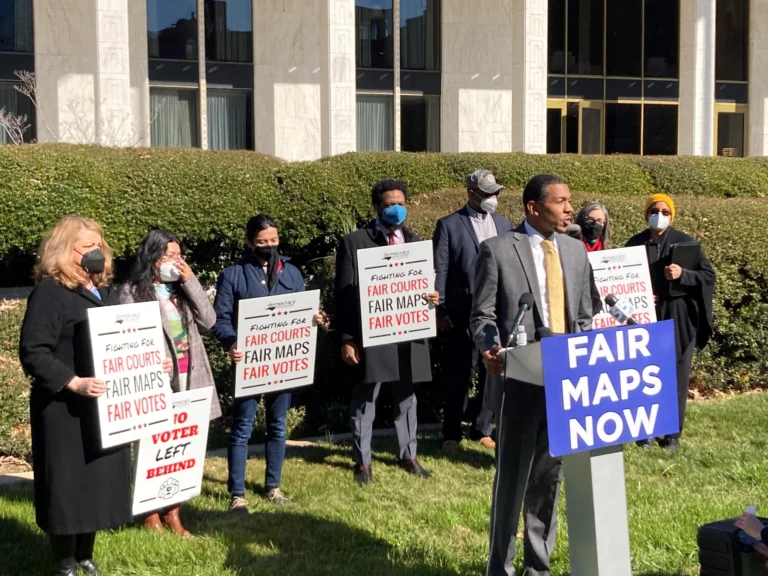A panel of federal judges has allowed North Carolina to use a new congressional map designed to give Republicans an additional House seat ahead of the 2026 midterms.
The redrawn map targets the state’s only swing seat, currently held by Democratic Rep. Don Davis. The 1st District has been represented by Black members of Congress for over 30 years. Under the new boundaries, the district’s Democratic share is projected to drop from 48% to 44%, according to analysis by CBS News.
The three-judge panel unanimously denied requests for preliminary injunctions following a mid-November hearing in Winston-Salem. The same judges recently upheld other districts redrawn by Republican lawmakers in 2023, which helped Republicans gain three seats in the 2024 elections.
North Carolina is among several states where GOP-led legislatures have redrawn congressional maps mid-decade, a strategy encouraged by former President Donald Trump to protect Republican control of Congress. Texas and Missouri have also adopted new GOP-friendly maps, although a lower court froze Texas’ map before the Supreme Court temporarily lifted that block.
Democratic-led states have countered with measures favoring their candidates. California voters approved new maps to boost Democratic chances, and the Virginia General Assembly proposed a constitutional amendment for redistricting. Democrats need just three additional House seats nationwide to regain control.
The Republican-controlled North Carolina General Assembly approved the district changes on October 22, without needing Democratic Governor Josh Stein’s consent. Senate leader Phil Berger hailed the ruling, saying it “thwarts the radical left’s latest attempt to circumvent the will of the people.”
The ruling addresses two lawsuits. One, filed by the state NAACP, Common Cause, and voters, argued that Republicans targeted North Carolina’s “Black Belt” instead of Democratic-leaning areas with more White voters. The second lawsuit challenged the use of five-year-old Census data for the mid-decade map, claiming it violates the Constitution and relied on race in violation of the First and 14th Amendments.
Republican attorneys defending the maps said the redraws were politically, not racially, motivated and part of a “nationwide partisan redistricting arms race.” They rejected claims that the maps retaliated against voters for exercising First Amendment rights and argued the use of older Census data complied with legal precedent.
Currently, Republicans hold 10 of North Carolina’s 14 House seats and hope to flip an 11th under the new map changes to the 1st and 3rd Districts. Trump won 51% of the popular vote in the state in 2024, making these races highly competitive. Candidate filing for these and other 2026 North Carolina races begins December 1.
Litigation noted that the redistricting could reduce the Black voting-age population in the 1st District from 40% to 32%, moving heavily Democratic counties to the 3rd District, currently represented by Republican Greg Murphy. Recent election results suggest both districts would favor Republicans under the new lines.
Many of the plaintiffs challenging the new 1st District map also sued over the 2023 redistricting, alleging Republican lawmakers packed and fractured Black voters to weaken their influence. Judges, all nominated by Republican presidents, dismissed those claims, saying plaintiffs failed to show the maps were drawn “with the discriminatory purpose of minimizing or canceling out the voting potential of Black North Carolinians.”







